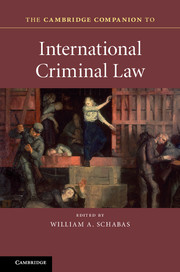Book contents
- Frontmatter
- Dedication
- Contents
- List of contributors
- List of abbreviations
- Introduction
- PART I PURPOSES AND PRINCIPLES
- PART II INSTITUTIONS
- 6 Ad hoc international criminal tribunals (Yugoslavia, Rwanda, Sierra Leone)
- 7 The International Criminal Court
- 8 National jurisdictions
- 9 The United Nations Security Council and international criminal justice
- PART III CRIMES
- PART IV TRIALS
- PART V THE FUTURE
- Index
- References
6 - Ad hoc international criminal tribunals (Yugoslavia, Rwanda, Sierra Leone)
from PART II - INSTITUTIONS
Published online by Cambridge University Press: 05 December 2015
- Frontmatter
- Dedication
- Contents
- List of contributors
- List of abbreviations
- Introduction
- PART I PURPOSES AND PRINCIPLES
- PART II INSTITUTIONS
- 6 Ad hoc international criminal tribunals (Yugoslavia, Rwanda, Sierra Leone)
- 7 The International Criminal Court
- 8 National jurisdictions
- 9 The United Nations Security Council and international criminal justice
- PART III CRIMES
- PART IV TRIALS
- PART V THE FUTURE
- Index
- References
Summary
After the end of the Cold War, the time was ripe for further and spectacular developments in international criminal law. For a long time after the creation of the post–Second World War tribunals of Nuremberg and Tokyo the efforts to establish successors were fruitless. Progress was made in the field of standard-setting, as is demonstrated by the adoption of the Genocide Convention, the Geneva Conventions and Additional Protocols, and the Convention against Torture. This progress was not matched by the creation of international judicial mechanisms aimed at ending – or at least reducing – impunity for the commission of international crimes.
This changed in the 1990s, when ad hoc international criminal tribunals were created by the United Nations directly (the International Criminal Tribunal for the former Yugoslavia and the International Criminal Tribunal for Rwanda) or by means of a treaty between the United Nations and a State (Special Court for Sierra Leone). The creation of the International Criminal Tribunal for the former Yugoslavia in 1993 and the International Criminal Tribunal for Rwanda in 1994, in particular, set in motion an almost unsaturated development of international criminal law. It was the upbeat to the later creation of the International Criminal Court, other international criminal justice mechanisms and renewed attention to prosecution of international crimes domestically. It made the relatively dormant field of international criminal law fully come to life. If the United Nations ad hoc tribunals made one thing clear it must have been that international criminal law can be a very powerful tool and that impunity for the most serious crimes is not self-evident.
One can hardly overestimate the importance of the United Nations ad hoc tribunals for the development and operationalisation of international criminal law. This chapter cannot do justice to their impressive achievements and contributions to the field. It is confined to a sketch and outline of what I perceive to be essential information on the ad hoc tribunals and also what I perceive to be their most significant contributions to the field of international criminal law. This analysis and the underlying choices are by definition selective. One is thus encouraged to engage in further reading within the rich variety of available literature on the topic.
The present chapter deals with the International Criminal Tribunal for the former Yugoslavia, the International Criminal Tribunal for Rwanda, and the Special Court for Sierra Leone.
- Type
- Chapter
- Information
- The Cambridge Companion to International Criminal Law , pp. 117 - 136Publisher: Cambridge University PressPrint publication year: 2016



